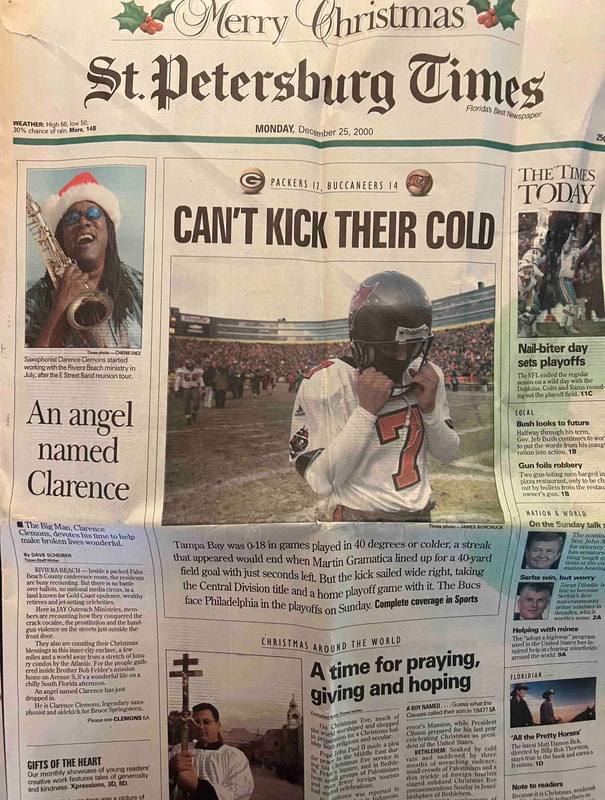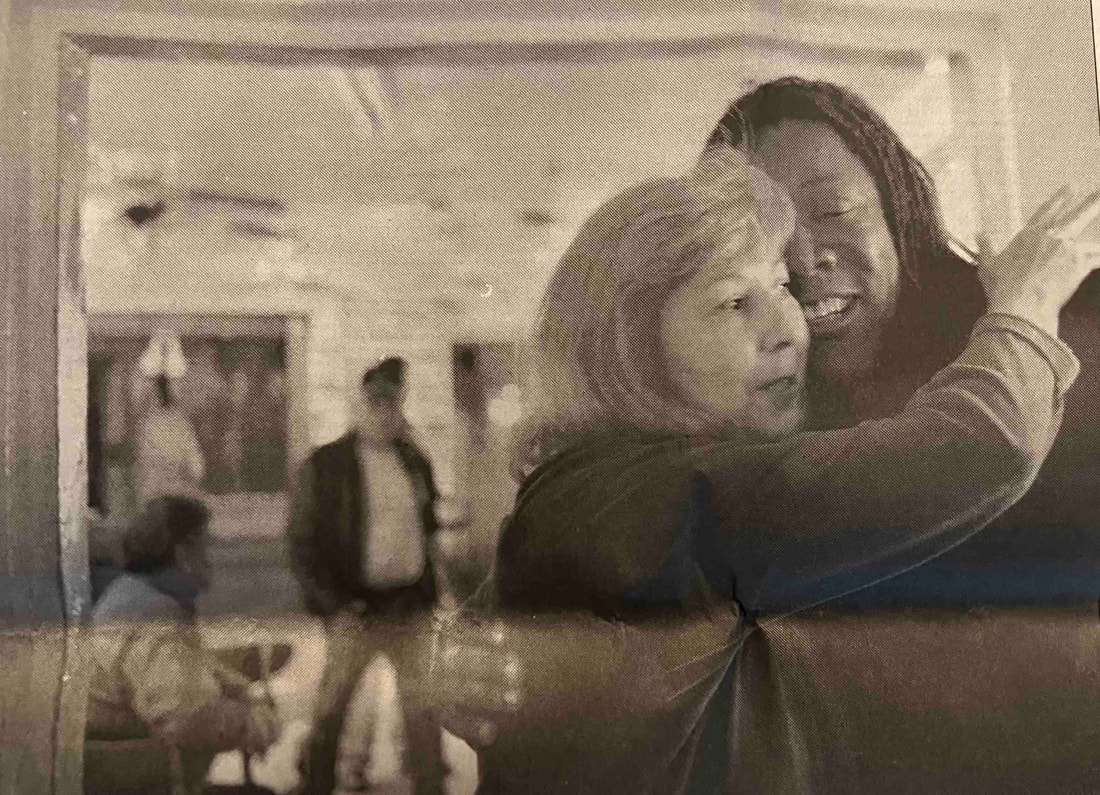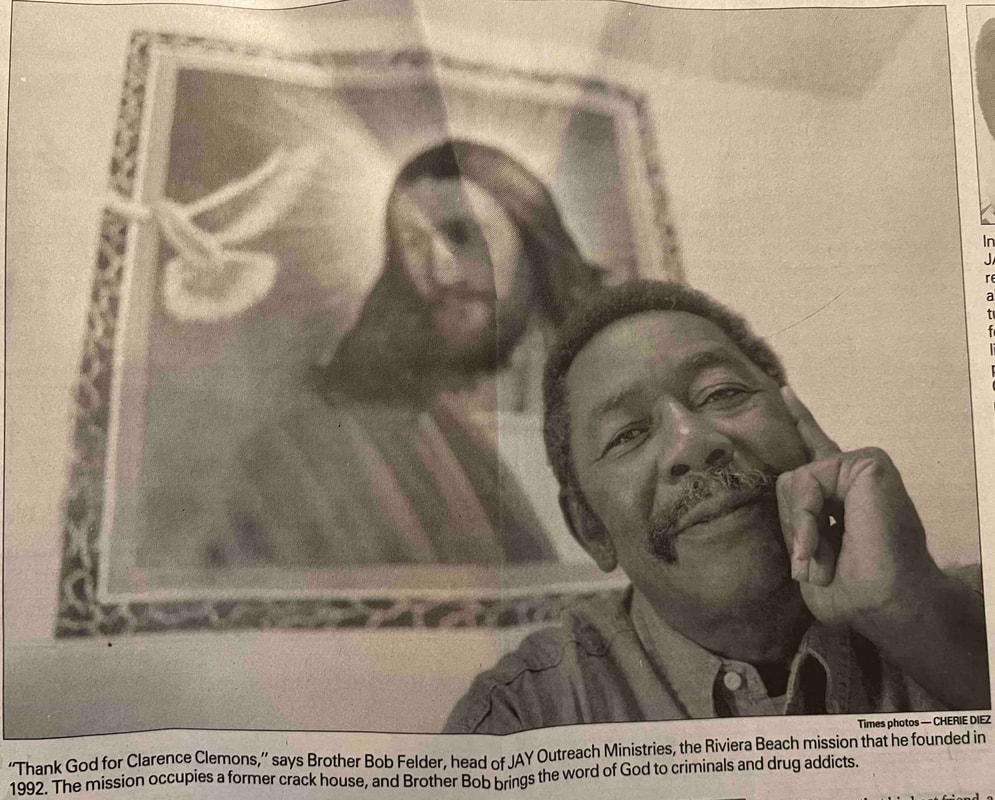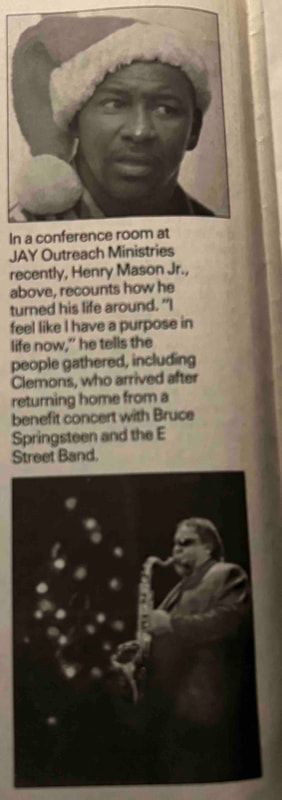An Angel Named Clarence
The Big Man, Clarence Clemons, devotes his time to help make broken lives wonderful
Story by DAVE SCHEIBER, Photos by CHERIE DIEZ
Published Dec. 25, 2000,
Published Dec. 25, 2000,
|
RIVIERA BEACH – Inside a packed Palm Beach County conference room, the residents are busy recounting. But there is no battle over ballots, no national media circus, in a land known for Gold Coast opulence, wealthy retirees and jet-setting celebrities. Here in JAY Outreach Ministries, members are recounting how they conquered the crack cocaine, the prostitution and the handgun violence on the streets just outside the front door. They also are counting their Christmas blessings in this inner-city enclave, a few miles and a world away from a stretch of luxury condos by the Atlantic. For the people gathered inside Brother Bob Felder's mission home on Avenue S, it's a wonderful life on a chilly South Florida afternoon. An angel named Clarence has just dropped in. He is Clarence Clemons, legendary saxophonist and sidekick for Bruce Springsteen, the heart and soul of the E Street Band, the Big Man. Only six hours earlier, at 5 a.m., Clemons arrived home in Palm Beach after a two-day holiday benefit with Springsteen and members of the the E Street Band and the Max Weinberg Seven in Asbury Park, N.J., raising money for boys and girls clubs, a women's center and food bank in central New Jersey. He is worn out from little sleep, but sits at a long table listening intently to the stories of faith and hope. The tales transport Clemons. He is far from his rock-star universe, where fans have screamed his name through four decades, where he has touched many people with his soaring, soulful sax work -- stirring his own brand of faith in the music and magic in the night for Springsteen devotees. "I come from a long line of Baptist preachers," he will say later. "I'm a preacher, but I don't preach from a pulpit. My music is how I reach people. I've always looked at saxophone as a vehicle to move me around places, to get me involved. Right now, this is where I'm supposed to be." The Big Man has a big plan. * * * There is still no mistaking him at 59 years old, a magnetic 6-foot-3, 300-pound presence dressed in black, with dreadlocks flowing well past his shoulders and eyes that seem to light up the room when he smiles. At the moment, though, tears streak his cheeks, as a man named Henry Mason Jr. tells his story: He was shot in the stomach and came to JAY (Jesus and You) to heal so that he could kill the man who had shot him. Instead, Mason talks of how he healed his spirit, gave up a life living and sleeping on the street and learned to read and write by studying the Bible at the mission. He has been clean for more than a year. "I feel like I have a purpose in life now," he says. A woman named Jennifer Clayton holds up a snapshot taken of herself three years ago, when she walked the streets of Riviera Beach as a hooker addicted to cocaine. She had lost custody of her five children when she came to Brother Bob in 1997 and turned her life around. "I've gained back my respect, my family, my friends, and most of all -- as of Aug. 21 -- I've gained back my children," she says as Clemons beams, and onlookers burst into applause. Another man wants to speak. His name is Bill Clark, who talks of spending much of his 47 years in prison -- doing time for drugs in parts of the '60s, '70s, '80s and '90s. Clark credits Brother Bob's mission for rescuing him not once but twice from the streets after his release from prison in New Jersey. Now a minister, Clark works full-time at JAY. He looks across the table at Clemons. "I used to listen to this man's music when I was sitting there in prison," he says. "This is something beyond my wildest dreams, to be an ex-con, a lifelong drug user, but then to sit here at the same table with a world celebrity like Mr. Clemons and a wonderful man of God like Brother Bob." When the testimonies are done, Clemons speaks softly in his familiar deep, mellow voice: "This is what we're talking about. Direct, immediate results. Straight to the heart of the matter." Clemons has been pouring his own heart into the cause since returning from Springsteen's record-setting reunion world tour in July. He heard of the mission's work, met Brother Bob over dinner and was overcome by a desire to help. His support has come in various ways. There are his visits to the one-time crack house, which now houses 47 recovering drug addicts, many of whom live rent-free as they get back on their feet and learn to hold jobs. But his largest contribution was an early Christmas present Nov. 28. After calling his contacts in the business world, Clemons coaxed Unilever Corp. into donating $25,000, paving the way for Brother Bob to open a women's center. Meanwhile, Clemons is trying to secure two large church-type vans to replace the broken-down vehicles used to transport mission residents to and from jobs. He says he is also in negotiations with other corporations for cash that could help expand Brother Bob's work in the community and trigger similar missions throughout the county and beyond. "Oh, I'm just getting warmed up," says Clemons, with a mischievous grin befitting the man known for his famous ho-ho-ho's in Springsteen's classic rendition of Santa Claus Is Coming to Town. "I'm going to get him involved in this, too. You know, That Guy." Whatever the charity-conscious Springsteen does, whatever else Clemons manages to do, he has already given a gift the people at the mission cherish: caring enough to try to make a difference. "Thank God," says Brother Bob, "for Clarence Clemons." * * * What Clemons remembers most about growing up in Norfolk, Va., is "being in love as a family." Clarence Clemons Sr. ran a fish market in town, and times were often tough for him and his wife, Thelma, and their three kids. But there was always a sense of togetherness, Clemons says. Especially at Christmas. "Thank God for Clarence Clemons," says Brother Bob Felder, head of JAY Outreach Ministries, the Riviera Beach mission that he founded in 1992. The mission occupies a former crack house, and Brother Bob brings the word of God to criminals and drug addicts. When he was 8, his parents could afford to give the children only comic books, but Clemons remembers it as a joyous Christmas anyway: "There was no money, but we had lots of food, and we had each other. My father was there in his room, snoring, and there was no more comforting thing in the world for me. It wasn't about presents." When he was 9, however, Clemons did ask his father for one present: an electric train set. "So I get up Christmas morning, and I see this big box, and I'm opening it up, and I'm thinking, what kind of train comes in a box like this?" he says. The train set turned out to be a gift that changed his life, a Pan American alto saxophone. He took lessons, but mostly he taught himself in between school, sports and working at the fish market. The turning point came as a teen. "I heard King Curtis play sax, and I saw Elvis on TV, and that was all it took to get me going," he says. Music became a driving force, reinforced by the songs from his Baptist church. "I could see God through the music, and I could feel love," he says. "I knew I wanted to keep the feeling that the music created inside me. And I wanted others to feel it." Clemons attended the University of Maryland-Eastern Shore on a music and football scholarship. He played gigs on the side, always sending money home to his parents. He was also a standout lineman. He graduated in 1966 with a degree in sociology. After college, Clemons decided to give pro football a try. There was a stint with the semipro New Jersey Generals, then an invitation to try out for the Cleveland Browns as a free agent. Driving to camp, however, Clemons lost control of his car, smashed into a tree and was thrown from the vehicle. "I knew I was dead, and I had that experience where I was looking down at myself on the ground," he says. "I saw light, and I felt so calm, but I was thinking, "I can't go now because I haven't finished what I'm supposed to do. There's something I have to do in this world still, and I want to go back.' " Clemons, seriously bruised and cut, left the hospital a week later. The accident caused him to give up his football dream and reassess his priorities. He wanted to uplift people, to make a difference. So he worked for eight years at a central New Jersey facility for mentally handicapped and emotionally disturbed male teens. He poured himself into the work: spent his own money on them to reward them with field trips to the nearby beaches, invented games to teach them discipline. The kids loved him. "I showed them respect, and it was the first time in their lives anybody ever had trusted them," he says. Clemons found another way to connect: with the sax. He always kept it in the trunk of his car and looked for places to sit in at night and on weekends. There were virtually no black musicians on the beach circuit in central Jersey, but Clemons hooked on with a band that often played Asbury Park clubs. Destiny was just down the boardwalk. There was a performer on the strip doing his own material, rocking the clubs with a high-energy style. Clemons' lead singer kept badgering him to check the guy out, and finally he agreed. Clemons was playing a place called the Wonder Bar; two blocks down, Bruce Springsteen was at the Student Prince. Springsteen has told the story of their first meeting many times in concert, embellishing it over the years in mythic detail. This much seems clear: The young Boss and his bandmates were missing something. They needed a spark. Out of the blue, Clemons stepped into their lives on a stormy night. * * * In a conference room at JAY Outreach Ministries recently, Henry Mason Jr. recounts how he turned his life around. "I feel like I have a purpose in life now," he tells the people gathered, including Clemons. "It was rainy and the wind was blowing, and it was really howling," Clemons recalls. "We had a two-hour break, because we played such long sets in those days. And I walked down to his place. I walked up to the door, opened the door, and a gust of wind blows the door -- I swear to God -- off the hinges and down the street. I'm standing there, a black guy in Asbury Park, across the tracks, with lightning and thunder behind me, and the band is on a break. I see Bruce, and I say, "I want to sit in.' Bruce looks at me and says, "Anything you want.' So I sat in, and halfway through the song, which I believe was Spirit in the Night, we looked at each other, and we knew. I saw the whole picture of the thing unfold before me." Clemons left his job to make $15 a week with Springsteen. His marriage fell apart, but the chemistry he felt with the music and the players had ignited a dream. "I had to follow it," he says. Thirty years later, out of the blue again, Clemons has stepped into the lives of a community. He is trying to knock down doors in Palm Beach, the kind that have closed off an overlooked part of the population. He says that he has a powerful sense of purpose, like that long-ago night in Asbury Park. "I see what this can become," he says. "It only takes one Brother Bob in each city, a person to treat the problems from the inside out. That's what will make the difference." * * * Life is good for Clarence Clemons. Oh, there's some pain from the double hip replacement that he underwent just before the reunion tour in 1999 and the aching in his knees that slows his gait a bit. It hurt far more that his best friend, a motorsports executive and sport-fishing pal named Dick Moroso, died two years ago of a brain tumor. Moroso was the man who persuaded Clemons to move to Florida from California seven years ago, and Clemons still mourns the loss. But Clemons has other reasons to smile. He has an ace group in town that he named Band of Faith, which plays West Palm clubs and will perform next at ESPN's Espy Awards. He has a culinary guide, The Big Man's Cookbook, coming out soon. The biggest news, though, is marriage, his third. Clemons fell in love at the front end of the tour with an interior designer in London. Clarence and Elizabeth Clemons were married Aug. 5. "I had no idea who he was when I met him," says Elizabeth, 48. "I just knew he was a sweet, special man." They live in a spacious condo on Singer Island filled not with mementos of Clemons' rock past but with African sculpture and marble tables. Standing on one table is an electronic African-American Santa holding a sax. It boogies to Deck the Halls. Beside a huge, leopard-spotted easy chair -- the Big Man's favorite spot -- rests a large Bible. The view is breathtaking here. From the front picture window high above the Atlantic Ocean, Clemons can watch the waves roll in. From the rear window he can see, off in the distance, the Riviera Beach neighborhood that is so close to his heart. That is where Bob Felder, certain that he heard God speak to him in a dream, walked away from a successful auto body business and all his possessions in 1988. He even lost his marriage to follow his heart and vision and minister on the mean streets. Felder became Brother Bob, spreading the word of God to drug addicts, criminals, prostitutes and wayward children. In 1992, he founded JAY ministries, recruiting "prayer warriors" and gaining financial assistance from surrounding churches. A former banker helped secure the building, a crack haven that Brother Bob's team renovated. Now there is a large kitchen, areas for dining and socializing, several dorm wings. Physicians and specialists come on site to work with men recovering from their drug and alcohol abuse. Neighborhood kids started out by breaking the windows and vandalizing property. Today, they gather every Saturday under the trees outside for arts and crafts and Bible study. They look forward to coming to the mission, where many lives have been pulled back from the brink and rejuvenated. Clemons' recent visit here finally comes to an end. "You're my family," he tells residents who gather around him. Then he gingerly slides into his blue Corvette with the tag "BLU LTNG" and revs the engine. In a flash, like the other Big Man who works Christmas, he disappears out of sight, keeping the faith and making spirits bright. |
|



